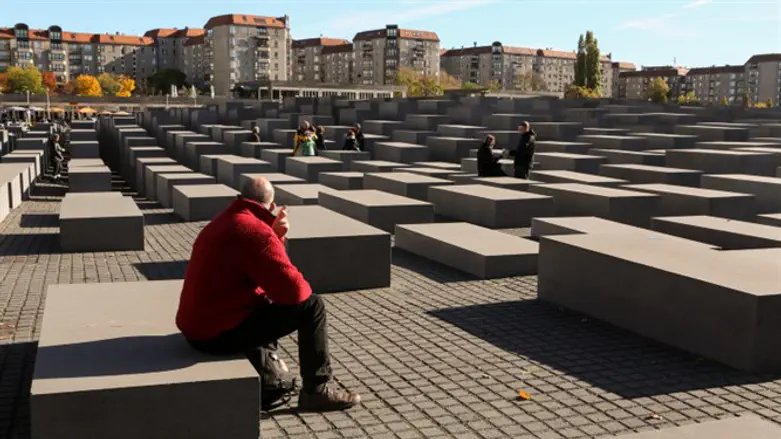
An Israeli satirist in Germany has launched a website using savage humor and shocking images to publicly shame visitors to Berlin's Holocaust memorial who post light-hearted selfies on social media.
The website by Berlin-based artist and activist Shahak Shapira, 28, is called Yolocaust, combining the words Holocaust and Yolo -- hashtag shorthand for "you only live once", and went live this week
It features a breathtakingly tasteless collection of photos Shapira says he found posted on social networks such as Facebook, Instagram and Twitter and also dating sites like Tinder and Grindr. The subjects are dancing, smiling, juggling and even doing yoga at the sprawling maze-like memorial.
Hovering the mouse over each "goofy" picture on the website photoshops in an authentic historical image showing the naked corpses of concentration camp victims.
Shapira says the provocative project is intended as a wake-up call for social media enthusiasts who may be unaware that they are on what many see as sacred ground. It is also timed to mark International Holocaust Remembrance Day on January 27.
Answering a list of "frequently asked questions", Shapira addresses issues such as what kind of behavior is "allowed" at the Berlin site, whose full title is the Memorial to the Murdered Jews of Europe and which he says draws an average 10,000 visitors per day.
"No historical event compares to the Holocaust. It's up to you how to behave at a memorial site that marks the death of six million people," is his tart reply.
He also preempts potential criticism of his use of the distressing images on the site with a bit of gallows humor.
"'Isn't this disrespectful towards the victims of the Holocaust?' Yes, some people's behavior at the memorial site is indeed disrespectful," he writes.
"But the victims are dead, so they're probably busy doing dead people's stuff rather than caring about that."
Along with the original selfies, Yolocaust includes the comments, hashtags and "likes" from the original social media accounts, including a caption reading "Jumping on dead Jews @Holocaust Memorial".
Shapira invites people who feel embarrassed by their photo being featured on the page to get in touch and he will remove it.
"Just send an email to undouche.me@yolocaust.de," he quips.
'Warning to Germany'
Reaction on social media to the website has been largely positive, and it crashed during its first hours online as it drew half a million clicks, according to his representatives.
However a few critics on Facebook noted that the memorial's American architect Peter Eisenman has said that he wanted visitors to treat it not as a cemetery but as a public space for people to engage.
The monument, which opened in 2005, includes a vast undulating labyrinth of more than 2,700 grey concrete blocks spread over an area equivalent to three football fields, as well as a subterranean museum dedicated to the testimony of Holocaust victims and survivors.
Sunbathers and children playing hide-and-seek are not uncommon sights at the memorial, which is one of Berlin's top tourist draws.
The German website of Vice magazine noticed the selfie trend there as early as 2013 and a series of glib photos taken at the Auschwitz memorial site in today's Poland have repeatedly caused outrage.
Shapira could not immediately be reached for comment but his publisher, Rowohlt, said that one of his grandfathers had "narrowly survived the Holocaust" while the other was murdered by Arab terrorists militants at the Munich Olympics in 1972.
He moved to Germany from Israel at the age of 14 and made headlines in 2015 when he was beaten up for filming a group of Arab youths chanting anti-Semitic slurs on the Berlin underground.
Shapira spoke out about the hate crime and subsequently met with Foreign Minister Frank-Walter Steinmeier and wrote a book about life as a Jew in today's Germany.
He said that he was dedicating his new website to the right-wing populist politician Bjoern Hoecke of the Alternative for Germany (AfD) party, who sparked an outcry Tuesday by attacking the Holocaust memorial as "a monument of shame in the heart of the capital".
"Of course Bjoern Hoecke sees nothing to like about a memorial that was built as a warning to Germany about people like him," Shapira told ZDF public television.